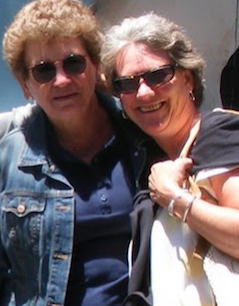Kathy and Dean— Depression At Any Age Can Be More Than Mood

According to her husband Dean, Kathy was always a tremendously happy person, outgoing and loving life. That is, until after the age of sixty, when she lost her older sister who was like a second mother to her. The two were very close and, although Kathy prepared herself for her sister’s passing, she was shocked at how hard it hit her; grief eventually turned into a deep depression.
At first, Kathy did not think there was anything wrong, responding to inquiries about how she was doing with, “I’m fine.” Then after a required communication seminar hosted by her employer, Kathy’s boss who had family experience with depression said to her “what’s going on with you? You don’t seem like yourself.” He discussed cognitive behavioral therapy (CBT) and gently suggested, that she might want to look into something to help her feel better. By him caring and not pushing, it showed Kathy that she needed to see her depression head on.
His observation resonated with Kathy and she did some research online. What she found was surprising. All her symptoms of being withdrawn, not wanting to spend time with family or friends, forgetting things, being disorganized, and making mistakes at work started to make sense. In addition to the isolation that is a hallmark of depression, Kathy was also experiencing the ROAM (reasoning, organizing, attention, and memory) cognitive symptoms of depression. Putting a name to her struggle was the first step. Another eye opener for Kathy was when her son and his wife were expecting their first baby. Kathy was surprised to find herself fearful instead of excited, and this startled her into taking action.

Kathy urges others with depression to not give up and take that first step, even if it is painful. “Waking up happy is a beautiful gift, but you have to work at it.”
Family Support Can Make All the Difference
Throughout the period when Kathy was experiencing depression, her husband was kind, supportive, and loving. Dean frequently asked her what he could do to help. He even offered to get her help of whatever kind she needed, no matter what the cost.
Dean noticed early on how withdrawn his wife had become. Because it was so out of character for her, it concerned him greatly. He tried everything he could think of to help but, in the beginning, Kathy was in denial. Observing her uncharacteristic behavior became painful and frustrating; Dean says it “tore him apart to see her suffering.”
Dean also understood that it was essential for him to take care of himself during this challenging time. He spent time with family and friends and relied on the fellowship of support groups to keep him positive for Kathy. Dean reminds us, “there is a big difference between knowing there is a problem and taking action to address it.” He encouraged her frequently but also knew when to take a step back and give her the space she needed to make her own decisions about how she wanted to handle her wellness.

Kathy found that making a gratitude list and being grateful helped her through her depression, and Dean encouraged her to continue this practice along the way. He lovingly recalls how supportive she has always been to him and is grateful to have been able to lend her that same support when she needed it the most.
Both Dean and Kathy now realize the importance of seeking help and how depression affects the whole family. Without information and supporters, Kathy’s depression could have worsened. Resources like the More Than Mood Toolkit are critical to taking that first step, recognizing what is going on, and finding ways to cope and feel better.
There is hope for anyone suffering from depression; you can get well. Kathy’s story is just one success story; there are so many others, and you can be one of them.
Additional Resources
- Can you relate to the cognitive symptoms Kathy has experienced with her depression? Learn more about ROAM and how depression may affect your thinking.
- If you would like to submit your personal or family story, please fill out this form.

